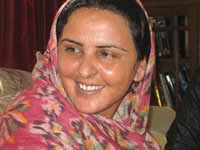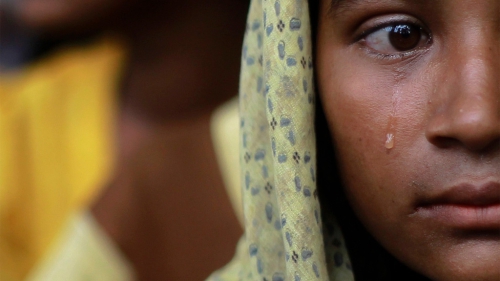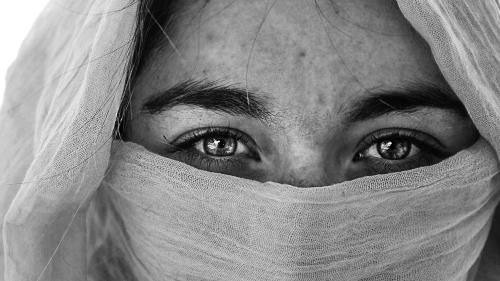Muslim American Voice of Justice
 |
Is it possible for a strong Islamic voice condemning violence against women to get serious attention by the American public? That's what several American Muslim organizations and individuals are trying to do in the case of Mukhtar Mai and her visit to the United States this week to be honored as "Woman of the Year" for Glamour Magazine. She plans to dedicate a portion of the $20,000 award to relief for victims of the recent devastating earthquake, as well as solicit more relief during her several speaking engagements raising awareness about the needs of women in Pakistan. Mukhtar Mai, it will be remembered, was subjected to a gang rape upon the orders of a tribal council in retaliation for alleged indiscretions by her brother. The six accused perpetrators were convicted and sentenced to death in 2002, then acquitted in March of 2005, then re-arrested days later, and now remain in custody pending an appeal before the Pakistani Supreme Court.
Yet despite this horrific incident and still waiting for justice, Mukhtar Bibi, as she is known, has emerged as a true grass roots activist for women in rural communities very much like the one she still lives in today, in a one-room home which often shelters others in need of help. She is now an iconic figure in Pakistan, working for the betterment of her people and, in particular, struggling for the rights and security of women, especially the poor and disempowered. In recognizing that what happened to her was due to "ignorance and lack of education" she established the Mai Mukhtaran School in her village, and includes classes from a woman scholar of Islam as part of the curriculum. She has reached out to victims of sexual violence providing them with essential support and consolation and called on her government to establish institutions where women can go to for help. Now with her visit to the United States, her struggle has acquired a broader audience.
What does this have to do with American Muslims? Everything. Mukhtar Mai has been a regular news story in every major American newspaper for years, and again made news this past summer when she was scheduled to visit the United States to speak in several venues about her experience. When President Musharraf stopped her from leaving the country, several human rights and women's groups understandably condemned this restriction on her freedoms. The resulting American public discourse on the story included major misunderstandings of what Islam has to say about rape and violence against women. This prompted some individuals from the San Francisco Bay Area Muslim community to wonder if there was anything we could and should do. Our answer? Yes. First, we took steps to invite Mukhtar Mai to our local communities to raise internal Muslim consciousness about her story. But we also were acutely aware of the prevailing American image of Islam as inherently bad for women and society. If Mukhtar Mai's visit is welcomed only by secular groups and no Muslims welcome or stand with her in support, then the unwritten message is: secular human rights groups help and seek justice for rape victims; Muslims hurt them or stand by silently. We recognized the glaring need for something much more public - a loud and clear Muslim-voiced condemnation of the gang rape, basing our position specifically on the tenets of Islam. Without a powerful and public statement in solidarity with her because of Islam's intolerance for such sexual violence against women, Mukhtar Mai's story may stand for nothing else in the American memory but one more reason to fear Islam and Muslims.
Keeping this in mind, Muslim activists and organizations drafted a Statement in Support of Mukhtar Mai. The Statement affirms that sexual violence against women is a horrible crime in Islam and that our religion requires us to stand firmly behind rape victims and to seek justice when such crimes occur. We are continually encouraged by the variety of groups that have endorsed our Statement, including several major mosques from California to New York, and local and national American Muslim organizations such as ISNA (Islamic Society of North America), MPAC (Muslim Public Affairs Council), NISA (North-American Islamic Shelter for the Abused), CAIR-SFBA (Council on American-Islamic Relations-San Francisco Bay Area), AMILA (American Muslims Intent on Learning and Activism) and others. We are still gathering signatures from American Muslim organizations, large and small. (The full text of the statement, and a link for those wishing to endorse the effort, is available at muslims4mukhtaran.halalfire.com).
Some Muslims might be inclined not to support this project. Perhaps they doubt that the rape ever happened. We considered this, and after considerable research we realized that this would contradict the overwhelming consensus of the world's preeminent human rights organizations, news reports, and even the Pakistani Attorney General currently prosecuting the appeal. Besides western newspapers, major Pakistani publications such as Dawn and The News, as well as reputed Pakistani columnists like Ardeshir Cowasjee and Irfan Husain have for three years accepted that Mukhtar Mai was gang-raped and have accepted her version of what transpired on June 22, 2002. Given all this, we were confident that Mukhtar Mai's story was the more credible. Some Muslims might not support our project because they are suspicious of internal Pakistani politics that seem to be using the case to their advantage. Whatever truth there may be in that, we believe it undeniable that if one believes that a rape did occur, a prosecution must go forward. The Muslim public must demand that crucial questions of justice be separated from political fights - both in the courtroom and in the media. And we should not fall into the trap of refusing justice to someone only because of those who choose to affiliate themselves with her case. If that can be done, we might be able to create a world where sexual violence against women is simply off-limits as a political tool.
We are proud of American Muslim contributions to the earthquake relief efforts in Pakistan and recognize that the recent disaster has admirably united the Pakistani nation in a tremendous spirit of brotherhood and sisterhood as demanded by our religion. We call on our community to once again voice their support for our Pakistani sister, Mukhtar Mai.
Muslims in the United States must also remain cognizant of our unique position in the American discourse, and the imperative which that presents in high profile cases. Often, the public has already made up its mind long before the final verdict. That is going on here. Regardless of who ultimately wins the Pakistani litigation, the American court of public opinion in the United States may have already decided that Mukhtar Mai represents yet another example of the travesty of Muslim justice that must be fought. We American Muslims can start to change that opinion, but our work is not in the courts of Pakistan, nor in its political debates. That is best shepherded by Pakistanis. We are, rather, responsible for presenting a clear, articulate American voice of justice in Islam. If we do that well, we might very well change the world, inshaAllah.
Muslims For Mukhtaran is working to organize the American Muslim community to provide an Islamic response to violence against women in Muslim countries. This statement was written by group members Asifa Quraishi, Shirin Sinnar, Farhan Memon, Asif Shaikh, and Uzma Siddiqui.
Related Suggestions
iam glad this sister is working to help others but it does give bad image of isalm and the kufir is only so happy to find another point of attack on muslims , if she is that much muslima wear the hijab right in the first place !
d
Although the incident is deplorable, the way it is used to undermine Islam is disgusting.
Peace out! Eid mubarak!
not to benefits of the victims.
I want to thank the authors for their good work in standing up four our sisters. In doing so, they are standing up for justice. May Allah reward you.

















